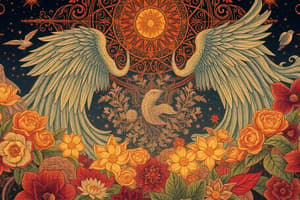Podcast
Questions and Answers
What does Carl Jung believe about fear of snakes?
What does Carl Jung believe about fear of snakes?
- It is a universal archetype.
- It is not influenced by life experiences.
- It is an inherited trait.
- It is learned through personal experience. (correct)
Jung believed that archetypes are limited to a specific cultural context.
Jung believed that archetypes are limited to a specific cultural context.
False (B)
What are archetypes according to Carl Jung?
What are archetypes according to Carl Jung?
Universal themes or symbols imprinted in our psyche.
The _______ is the social mask or identity presented to the world.
The _______ is the social mask or identity presented to the world.
Match the following archetypes with their descriptions:
Match the following archetypes with their descriptions:
Which archetype represents the maternal figure in Jung's theory?
Which archetype represents the maternal figure in Jung's theory?
Anima and Animus must be expressed according to Jung.
Anima and Animus must be expressed according to Jung.
What risk does the identification with the persona pose?
What risk does the identification with the persona pose?
Which two psychological functions are considered nonrational according to Jung?
Which two psychological functions are considered nonrational according to Jung?
What does the shadow represent in Carl Jung's analytical psychology?
What does the shadow represent in Carl Jung's analytical psychology?
Extraverted thinking individuals usually follow society's rules closely.
Extraverted thinking individuals usually follow society's rules closely.
According to Jung, the ego is the source of spontaneity, creativity, and emotion.
According to Jung, the ego is the source of spontaneity, creativity, and emotion.
What are the four principal psychological functions identified by Jung?
What are the four principal psychological functions identified by Jung?
What is the role of the ego in relation to instincts?
What is the role of the ego in relation to instincts?
The __________ focuses on pleasure and happiness, seeking new experiences.
The __________ focuses on pleasure and happiness, seeking new experiences.
Match the following Jungian types with their characteristics:
Match the following Jungian types with their characteristics:
The two opposing mental attitudes in Jung's theory are __________ and __________.
The two opposing mental attitudes in Jung's theory are __________ and __________.
What is the main characteristic of individuals with introverted thinking?
What is the main characteristic of individuals with introverted thinking?
Match the following aspects of personality with their descriptions:
Match the following aspects of personality with their descriptions:
Intuiting produces experiences solely through sensory input.
Intuiting produces experiences solely through sensory input.
A one-sided personality development refers to the neglect of which aspects?
A one-sided personality development refers to the neglect of which aspects?
According to Jung, __________ types often find success in business by exploiting opportunities.
According to Jung, __________ types often find success in business by exploiting opportunities.
Jung believed that everyone has a dominant attitude that shapes their behavior.
Jung believed that everyone has a dominant attitude that shapes their behavior.
What must be tamed according to Jung's concept of the shadow?
What must be tamed according to Jung's concept of the shadow?
Which of the following styles of life displays a ruling attitude with little social awareness?
Which of the following styles of life displays a ruling attitude with little social awareness?
The avoiding type faces life’s problems head-on.
The avoiding type faces life’s problems head-on.
Who is referred to as the most common human type according to Adler?
Who is referred to as the most common human type according to Adler?
The _____ type cooperates with others and acts in accordance with their needs.
The _____ type cooperates with others and acts in accordance with their needs.
Match the birth order with their characteristics:
Match the birth order with their characteristics:
What is a potential outcome for extreme cases of the dominant type?
What is a potential outcome for extreme cases of the dominant type?
Last-born children experience dethronement by another sibling.
Last-born children experience dethronement by another sibling.
At what age is the style of life typically firmly established?
At what age is the style of life typically firmly established?
Which of the following theorists emphasized social forces in personality?
Which of the following theorists emphasized social forces in personality?
Karen Horney believed that psychological differences between men and women were primarily biological.
Karen Horney believed that psychological differences between men and women were primarily biological.
What did Karen Horney argue regarding the male genital in her feminist perspective on psychoanalysis?
What did Karen Horney argue regarding the male genital in her feminist perspective on psychoanalysis?
According to Adler, future goals are more important than _____ events.
According to Adler, future goals are more important than _____ events.
Match the theorists with their contributions:
Match the theorists with their contributions:
Which statement reflects Horney's views on girls' desires?
Which statement reflects Horney's views on girls' desires?
Freud believed that Adler's ideas were complex and difficult to learn.
Freud believed that Adler's ideas were complex and difficult to learn.
Who referred to Adler's insights into human nature as impressive?
Who referred to Adler's insights into human nature as impressive?
According to Karen Horney, what are people primarily motivated by?
According to Karen Horney, what are people primarily motivated by?
Horney believed that childhood conflicts are inevitable in the development of personality.
Horney believed that childhood conflicts are inevitable in the development of personality.
What does Horney mean by 'basic anxiety'?
What does Horney mean by 'basic anxiety'?
Horney argued that modern culture fosters a sense of __________ among individuals.
Horney argued that modern culture fosters a sense of __________ among individuals.
Match the following coping strategies with their descriptions:
Match the following coping strategies with their descriptions:
What results from feelings of isolation according to Horney?
What results from feelings of isolation according to Horney?
Horney believed that love can solve all of life's problems.
Horney believed that love can solve all of life's problems.
What does Horney propose is the key factor in personality development?
What does Horney propose is the key factor in personality development?
Flashcards
Jung's Shadow
Jung's Shadow
Hidden or suppressed aspects of ourselves, including desires and instincts that society deems immoral; a powerful archetype with deep roots. It also contains creativity and emotion.
Shadow's Role
Shadow's Role
The source of creativity, emotion, and spontaneity.
Ego
Ego
Center of consciousness that perceives, thinks, feels, and remembers. Responsible for everyday activities and controls what we are conscious of.
Extraversion
Extraversion
Signup and view all the flashcards
Introversion
Introversion
Signup and view all the flashcards
Jung's Personality Structure
Jung's Personality Structure
Signup and view all the flashcards
Psychological Functions
Psychological Functions
Signup and view all the flashcards
Attitude Dominance
Attitude Dominance
Signup and view all the flashcards
Innate fear of snakes?
Innate fear of snakes?
Signup and view all the flashcards
Collective Unconscious
Collective Unconscious
Signup and view all the flashcards
Archetypes
Archetypes
Signup and view all the flashcards
Persona
Persona
Signup and view all the flashcards
Anima
Anima
Signup and view all the flashcards
Animus
Animus
Signup and view all the flashcards
Jung's Analytical Psychology
Jung's Analytical Psychology
Signup and view all the flashcards
Ego Identification with Persona
Ego Identification with Persona
Signup and view all the flashcards
Nonrational Functions
Nonrational Functions
Signup and view all the flashcards
Sensing
Sensing
Signup and view all the flashcards
Intuiting
Intuiting
Signup and view all the flashcards
Rational Functions
Rational Functions
Signup and view all the flashcards
Thinking
Thinking
Signup and view all the flashcards
Feeling
Feeling
Signup and view all the flashcards
Jung's Psychological Types (Summary)
Jung's Psychological Types (Summary)
Signup and view all the flashcards
Life Style
Life Style
Signup and view all the flashcards
Dominant Style
Dominant Style
Signup and view all the flashcards
Getting Style
Getting Style
Signup and view all the flashcards
Avoiding Style
Avoiding Style
Signup and view all the flashcards
Socially Useful Style
Socially Useful Style
Signup and view all the flashcards
First Born
First Born
Signup and view all the flashcards
Second Born
Second Born
Signup and view all the flashcards
Youngest Child
Youngest Child
Signup and view all the flashcards
Horney's View on Personality
Horney's View on Personality
Signup and view all the flashcards
Horney's Emphasis on Security and Love
Horney's Emphasis on Security and Love
Signup and view all the flashcards
Competition in Modern Culture
Competition in Modern Culture
Signup and view all the flashcards
Basic Anxiety
Basic Anxiety
Signup and view all the flashcards
Securing Affection
Securing Affection
Signup and view all the flashcards
Being Submissive
Being Submissive
Signup and view all the flashcards
Attaining Power
Attaining Power
Signup and view all the flashcards
Horney's Feminist Psychoanalysis
Horney's Feminist Psychoanalysis
Signup and view all the flashcards
Social Power Symbol
Social Power Symbol
Signup and view all the flashcards
Girls' Social Power Desire
Girls' Social Power Desire
Signup and view all the flashcards
Early Feminist Voice
Early Feminist Voice
Signup and view all the flashcards
Cultural Influences on Gender?
Cultural Influences on Gender?
Signup and view all the flashcards
No Secret Boy Desire
No Secret Boy Desire
Signup and view all the flashcards
Adler's Influence on Horney
Adler's Influence on Horney
Signup and view all the flashcards
Uniqueness of Personality
Uniqueness of Personality
Signup and view all the flashcards
Study Notes
Psychodynamic Approach: Forces Beneath Personality
- Psychodynamic approach focuses on the forces beneath personality, often stemming from childhood.
- Key concepts include the topographical and structural models.
Topographical Model
- Describes levels of the mind:
- Conscious mind: Current awareness
- Preconscious mind: Easily accessible memories and feelings
- Unconscious mind: Hidden memories, feelings, and desires that influence behavior.
Structural Model
- Describes the structure of personality:
- Id: Primitive, instinctual drives (pleasure principle)
- Ego: Mediates between id and reality (reality principle)
- Superego: Internalized societal rules and moral standards (morality principle)
Stages of Psychosexual Development
- Freud proposed stages of psychosexual development impacting personality.
- Oral stage (birth to 18 months): Focus on the mouth, satisfaction through sucking and swallowing. Fixation can lead to overeating, smoking, drinking
- Anal stage (1 1/2 to 3 years): Focus on the anus, control and discipline. Fixation can lead to obsessiveness around neatness and order or messiness and disorganization.
- Phallic stage (3 to 6 years): Focus on the genitals, Oedipus complex and castration anxiety. Development of the superego. Successful resolution leads to success on society.
- Latency period (6 to puberty): Focus on social interactions with same gender. Repressing sexuality.
- Genital stage (puberty onward): Focus on genitals and sexual urges; establishing intimacy. Development of a mature ego, the id and superego in balance.
How We Access the Unconscious: Therapy
- Therapy explores unconscious conflicts to resolve problems.
- Dreams: Manifest (disguised) and latent (true) content reveal unconscious desires.
- Freudian slips (unintentional errors) and free association reveal hidden motivations.
Freud: A Critique
- Theory is criticized for being male-oriented, overlooking women's experiences
- Reliance on specific cases (potential bias & misrepresentation)
- Therapy duration is considered lengthy
- Therapy forces the person to accept the therapists' reality
Neo-Freudians
- Diverse theorists who built on Freud's ideas but emphasized different factors.
- Carl Jung: Analytical Psychology: Expanded unconscious to include collective unconscious and archetypes (e.g., persona, anima/animus, shadow).
- Alfred Adler: Individual Psychology: Emphasized social forces, conscious experience, and striving for superiority
- Karen Horney: Psychoanalytic Social Theory (Feminist Psychoanalysis): Focused on social and cultural factors, especially women's experiences, and developed neurotic needs
Advantages and Limits of the Neo-Analytics
- Advantages: Highlight importance of positive and goal-oriented nature of humanity, acknowledge impact of society/culture.
- Limits: Difficult to test empirically, sometimes mix of ideas from various traditions, sometimes relies on vague concepts
Studying That Suits You
Use AI to generate personalized quizzes and flashcards to suit your learning preferences.




